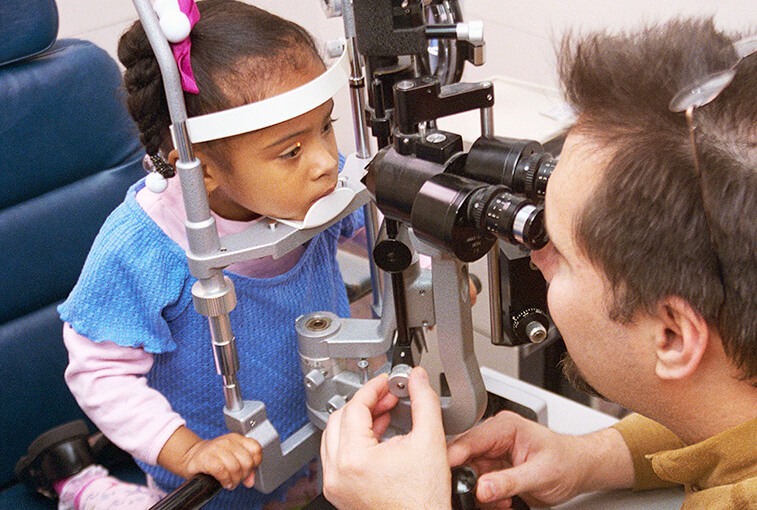Joy Quitberg, O.D., a Sanford Health optometrist, commonly sees glaucoma, cataracts and macular degeneration, all of which increase with age.
Here’s a look at the difference between these diseases.
- Glaucoma: Fluid buildup in the eye that causes damage to the optic nerve. It can lead to blurred or narrow field of vision and pain in the eyes, among other symptoms.
- Cataract: Clouding of the lens of the eye that causes cloudy and blurry vision, poor night vision, double vision or distortion of vision.
- Macular degeneration: Affects central vision and is the most common cause of loss of eyesight in adults 60 and older. Symptoms include blurry or fuzzy vision, difficulty recognizing faces, difficulty reading, driving or doing other daily activities.
Although vision problems are expected with age, most people overlook the possibility of eye issues in young children, especially those caused by exposure to blue light from laptop and smartphone screens. This blue light has contributed to an increase in the use of prescription reading glasses and artificial tears or eye drops for dry eye in children. Blue light also increases the rate of macular degeneration.
Dr. Quitberg often gets asked at what age should parents start getting their child’s eyes checked. She recommends regular eye exams at an early age: 6 months to 1 year old. Members of the American Optometric Association, including Dr. Quitberg, offer free exams for infants between these ages. She believes that there is an advantage to bringing young children in for an exam to make sure the eyes are healthy and working properly.
Protecting your vision
Dr. Quitberg says there are a few things people can do to prevent or at least slow the progression of many vision-related issues.
Prescription glasses offer blue light lens coating that protect from screens, increasing comfort and reducing strain on the eyes caused by technology. For those with 20/20 vision, glasses with blue light lens coatings are available without prescription lenses. Although this doesn’t eliminate the harm from screens, it protects from some of the damage caused to the eyes from blue light.
To keep the eyes at optimal health for as long as possible, Dr. Quitberg also recommends:
- Annual eye exams
- Eating healthy
- Exercising regularly
- Not smoking
- Wearing quality sunglasses year-round
Sunglasses are important throughout the year because sunlight can cause or increase damage to the eyes or even sunburn them. Dr. Quitberg often sees vision-related issues that could have been prevented or postponed with proper protection from the sun.
According to Dr. Quitberg, reflections from the snow can cause damage to eyes as well. When purchasing sunglasses, Dr. Quitberg recommends focusing on three main criteria:
- UVA and UVB protection: A good pair of sunglasses should block 100 percent of both UVA and UVB rays.
- Polarization: Polarized lenses don’t increase the protection from the sun but do reduce the glare from it. This makes activities like driving safer and more enjoyable.
- Lens color: Darker sunglasses are not always better. Glasses with amber or brown lenses, for example, can help increase depth perception or contrast.
Who to see for eye care
Providers working in Sanford Health eye clinics include ophthalmologists and optometrists. Here’s a brief look at what people in those different roles do.
Ophthalmologists
Sanford Health’s ophthalmology physicians, who go to medical school and then an ophthalmology residency, diagnose and treat disorders and diseases of the eye.
An ophthalmologist specializes in diagnosis and treatment of refractive, medical and surgical problems related to eye diseases and disorders.
Ophthalmologists provide a wide range of eye-related services from comprehensive eye exams to performing eye surgery. At Sanford Health, ophthalmology subspecialties in addition to retina include pediatric ophthalmology surgery, sutureless cataract surgery, laser surgery and plastic surgery.
Optometrists
Sanford Health’s optometrists attend optometry school for four years. They provide general eye care for children through seniors, including primary vision care ranging from routine eye exams to the diagnosis, treatment and management of changes in vision. This may include prescribing corrective lenses, detecting vision abnormalities or prescribing medications for ocular diseases.
Optometrists have various specialties including family and pediatric vision care, treatment and management of diseases, vision loss due to head trauma and brain injuries, as well as vision therapy for children and adults.
An optometrist can refer patients to Sanford Health ophthalmologists or other specialists for further evaluation and treatment if diseases are suspected or discovered.
Learn more
- New lens allows for vision correction after cataract surgery
- Seeing your options through eye disease
- Exceptional eye care inspires giving
…
Posted In Back to School, Children's, Eye Care, Health Information, Healthy Living
